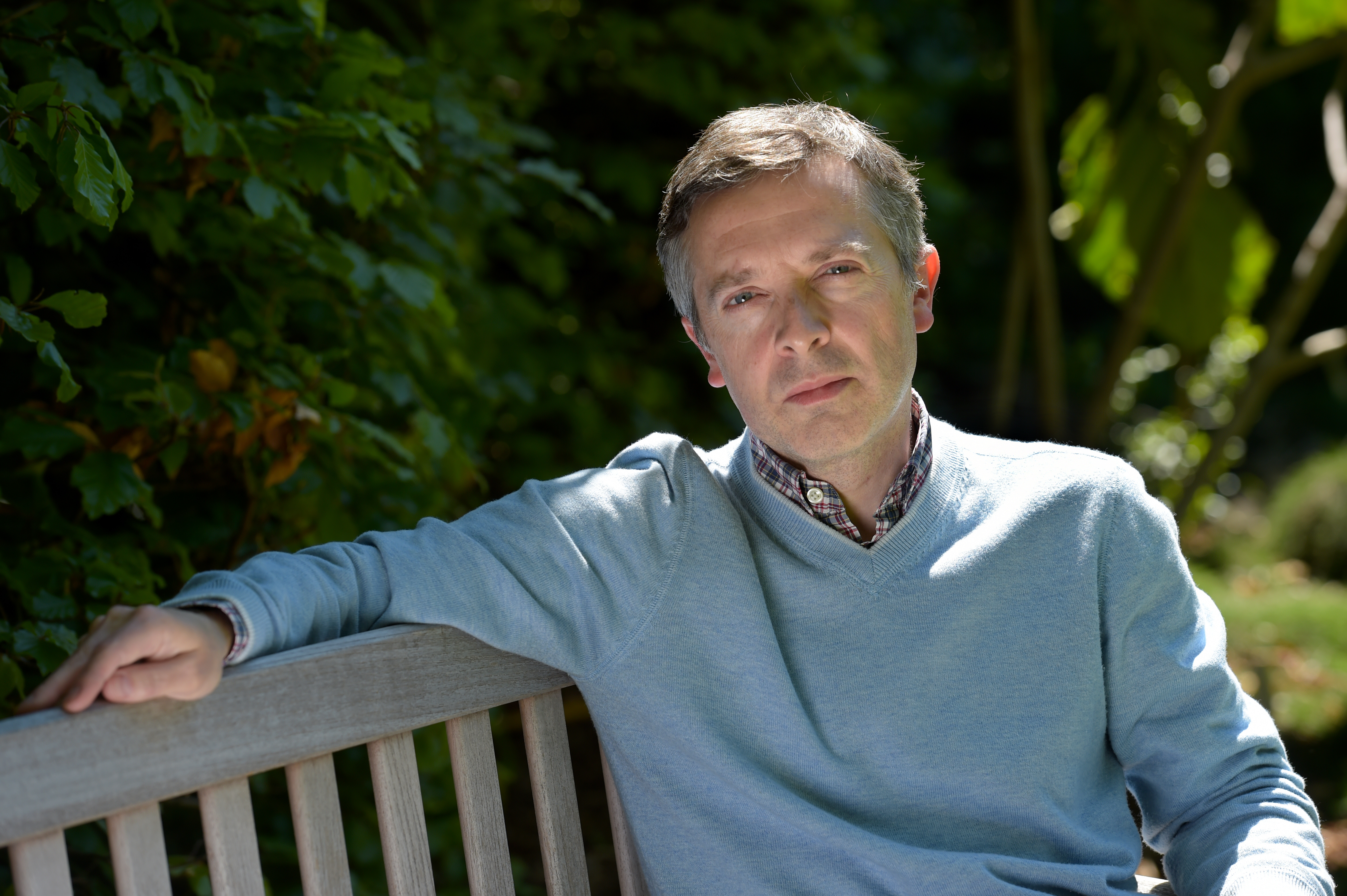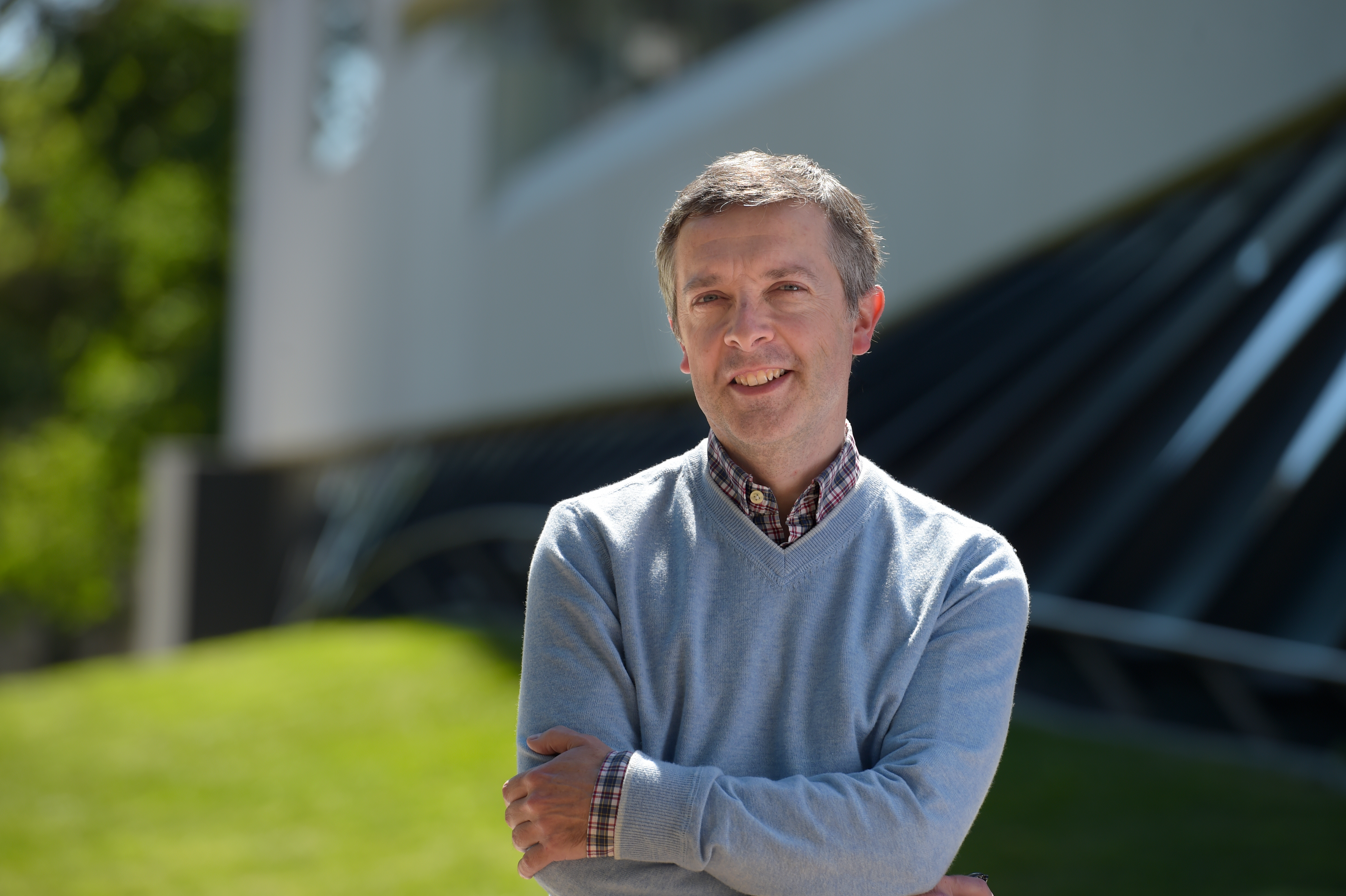Stuart Greenbaum: Composed at 50

The planets have aligned for one of Australia’s best-known composers, but time and tide stop for no-one
Published 5 December 2016
Stuart Greenbaum, one of Australia’s most widely-performed composers and Head of Composition at the Melbourne Conservatorium of Music, is 50. Or, he will be soon. He’s not there yet, despite the imminent Stuart Greenbaum at 50 concert at Melba Hall.
“It was my colleague Dr Elliott Gyger’s idea,” he says. “I’ll be 49 when it happens, but I turn 50 on the 25th of December so, by dint of that technicality, yes, it’s my 50th-birthday year.”
The MCM New Music Studio will present Professor Greenbaum’s Chamber Concerto (2008) and Chamber Concerto No.2 (2011).
When we meet the rehearsals are yet to begin, and Professor Greenbaum is uncertain when, and to what degree, he’ll be involved. “Composers can be overbearingly present when people just need a bit of room,” he says. “Quite possibly I won’t turn up to the first rehearsal. Elliott knows my music and has a good handle on where it’s coming from.”
He views his works, more than 190 for the concert stage, as “living, breathing objects” – which has its pros and cons.
“Regrettably, I’m a revisionist, so every time I listen to my music I’m asking if it’s still what I want. That helps you grow as an artist, but it also means you’re far less likely to be a satisfied human being. Having so many works is like having a beautiful tree in your garden. It gets bigger and more beautiful every year, but sheds more and more leaves that have to be cleared up.”
His mother, Betty Scarlett, studied piano at the MCM in the 1950s. His father, Geoffrey, though not a musician, had an influence too. “I have a distinct memory as a seven-year-old of wandering into his study to play him a few bars on the guitar and saying it was my own piece,” he says. “He gave me five cents and said, ‘Can you come up with another one?’”
Professor Greenbaum’s wife, Marianne Rothschild, is a violinist. Their children – Aksel, 12, and Hanna, eight – play the guitar, and cello and piano, respectively. “They’re a handful,” he says. “They’re amazing.”
As a young man, Professor Greenbaum played electric guitars – and rock and pop still inform his compositions. Ross Baglin, his bandmate at 18, remains one of his closest collaborators. Together, with Baglin as librettist, they have created two successful operas (Nelson, 2005, and The Parrot Factory, 2010), 11 choral works, numerous art songs.
“We don’t rubbish each other’s work but we also don’t tiptoe around issues,” says Professor Greenbaum. “There’s a lot of humour and goodwill between us.”
Following his Masters degree in the early 90s, he found work as a composer with Melbourne’s Playbox Theatre, writing music for scenes that may, or may not, make the cut. “It drove me to distraction,” he says. “But in retrospect I’m so immensely grateful to all those people because they radically influenced how I think about time and drama in music.”
In the years since, his music has become more sophisticated and complex but its DNA remains the same. “I’ve always written music that’s harmonically and rhythmically overt and direct. My musical language now is not radically different from when I was 25, half a lifetime ago.”
On the most basic level, it is steered by what sounds good. “But more deeply it’s actually about existentialism. You get to a point in your career where there’s no point in writing another piece unless there’s something new in it.”
Up to 90% of his composition process now takes place at a screen. “But if I sit down and try to write a melody straight into the computer, it’s doomed,” he says. “A certain amount of musical impetus needs to be coming from your inner ear or a real musical instrument.”
It can come when he’s out walking, riding his bike, doing the groceries. “I could be lying in bed at four in the morning thinking I don’t want to get up, but if I don’t I might not remember what’s buzzing around in my head. Once something feels alive and is in the basket, I can do all manner of things with it.”
Deep space
One need only look at titles such as 800 Million Heartbeat, Double Planet, and 90 Minutes Circling the Earth, for clues to Professor Greenbaum’s thematic concerns: the universe, and our place within it, looms large. “I love that metaphor for what it says about individuals, what our lives mean, our connectivity, our borders, our wars ...”
In space, of course, no-one can hear you clap – and that’s fine. “I think most artists seek an audience,” he says. “But applause, I’m not so sure. Compositionally, what I secretly desire is lots of silence either side of my work. I’d feel guilty for the performers but if I had my way no-one would clap at the end – the audience would just walk out.”
He is currently ten pieces into a suite of 20 for his Sonata Project, which will involve a major recital work for all the major orchestral instruments, and a couple of others besides. “Most of them are accompanied by piano, so they’re really duos,” he says. “It means they’re very achievable in performance terms.” The portability of that model, its replicability compared to an orchestra piece, appeals.
“Contemporary music’s single biggest problem is too many one-night stands,” he says. “It’s like saying to a rock group, ‘Change your personnel every three weeks’ – you probably won’t end up sounding like the Rolling Stones that way.”
Controlling the roller-coaster
Not surprisingly, combining a full-time senior academic position and two young children with writing music presents its challenges – a big one being time. “I’ve asked myself whether I’d be happier if I just stopped writing completely,” he says. “My music is one of the most exciting things in my life, but it’s also one of the most depressing, and I’m not in full control of that roller-coaster.
“But I think I’m probably hard-wired to be wandering around wondering about this stuff. I just have to try and do as best I can and try not to torture the people around me.”

Time is playing on his mind in other ways , as the big 5-0 approaches. “I’ve read articles that say 51, 52 and 53 can be fabulous,” he says. “But I’m an atheist. I think the time we have on the planet is all we get. The thought of mortality sits uncomfortably with me and I think a lot of my music ultimately is about that. Some of my pieces are melancholic and sad but I deeply hope they also have an element of consolation about them.”
Isn’t that what music does, I wonder. Isn’t that the whole point?
“There’s a quote by the late American author Kurt Vonnegut that says, ‘We are here to help each other get through this thing, whatever it is’. I think that pretty much sums up how I feel.”
New Music Studio: Stuart Greenbaum at 50, takes place on 12 December, 6.00pm–7.00pm at Melba Hall, Parkville, Melbourne. Full details here.
Banner image: Stuart Greenbaum. Picture: Sarah Fisher
